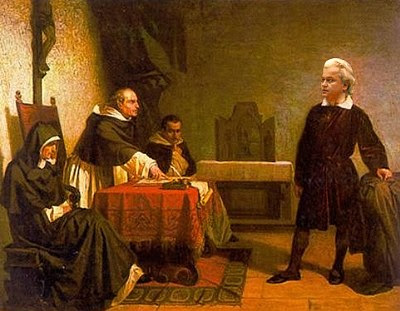
Part of the plea by Mr. Bram Moszkowicz in the Wilders Trial
Translated by VH
Mr. Chairman, members of the court, members of the prosecution, today, Mr. Chairman, I defend a dissident, and his name is Geert Wilders, and who’d have thought of this in 2010, in the Netherlands.
Since yesterday, Mr. Chairman, I have constantly had an image in my mind, and I cannot get rid of it, one that is somewhat characteristic of this process, and which also shows the absurdity of it.
The lawyers for the aggrieved parties took the floor; it was a motley crew, partly also deaf. Ms. Prakken suggests, as one of the speakers on behalf of the aggrieved parties, that Mr. Wilders had talked about ‘a tsunami of Muslims’, while she knows very well, or at least should know, or could have known, that my client spoke of a tsunami of Islamization. That is something quite different. But that is not at all I wanted to say at this point. All the lawyers for the aggrieved parties failed to follow the framework in which they were allowed to speak. Clearly that context has been outlined a number of times by your court. And then as recently as yesterday, a lawyer refuses to rise for judges in the Netherlands, and we, not I, permit his refusal.
The man took the floor and compared my client in passing to Hitler. Unlike me, my client Wilders believes that the man may say this. The lawyer I am talking about does not rise for the court, because he takes our system not to be his. At the same time, Mr. Chairman, members of the court, he does make an appeal to our system when it suits him, by wanting to make to use of the opportunity provided by our law to speak. The world upside down. See here the trial against Geert Wilders in a ‘nutshell’.
In Florence in 1632, Mr. Chairman, members of the court, the book Idelologo by Galileo Galilei appeared. A polemical treatise in which the geocentric view, current within the Catholic Church, was more or less made ridiculous. That was contrary to all opinion, and did not go unnoticed. Galileo had to justify himself to the clergy, and renounce his ideas. Rehabilitation followed much later.
Wilders does not compare himself with Galileo, but does reflect on him. Someone who goes against the prevailing doctrine. Someone who does not let himself be gagged by religious institutions and conventions. A dissident in the current era as Galileo was a dissident in his own. Someone with a different view.
Even so, the ideas of Galileo could not be curbed. Some things you cannot hold back. Even after his conviction, as the perhaps apocryphal story goes, Galileo said, ‘eppur si muove’. Which means ‘and yet it moves’.
The case against Galileo should not have proceeded. Galileo based his argument on empirical material, and that went against the prevailing dogma.
Did he proclaim an opinion, president, members of the court? Wilders, too, bases his words on facts. The OM has in this respect taken the position that, certainly concerning this matter, I quote, ‘the truth cannot be determined’. It would also ‘not at all be of importance in assessing his expressions’, and even says ‘a misconception’.
Although the OM at the same time acknowledges, and this is what it is about for me, that with the assessment of Wilders’ statements on the basis of European case law, it must be taken into account whether they have any factual basis.
That’s what I have always said, and that is what I say again today. Grass is green: is that an opinion? One plus one is two, is that an opinion? ‘The Bible and Torah and many other ancient books, for example, also in those, things about homosexuals are stated, which when taken literally, cannot be accepted,’ end quote. Is that an opinion? This is a quote from the rejection letter by mister Velleman [Prosecutor], dated December 7, 2002, which I have already submitted to the court.
When the prosecution, in such a rejection letter in response to a report by someone who was deeply grieved by statements in the Koran, established something similar, is that an opinion then, president, members of the court? Or, does the OM establish a fact?
In any case, Wilders’ position is that the more truthful his statements are, the more room he should get to express them. This is a primary position. Wilders’ position will be that in the framework of this procedure, commencement included, no one has contested his positions with respect to their contents.
Those who filed the charges did not, the complainants did not, the experts did not, the Court did not, the police did not, and the OM did not. And, Oh, how easy, how easy it is to accuse Wilders of intolerance, to accuse him of xenophobia, to brand him as an extremist, without having to enter into this discussion. This is notably a reproach that is made towards Wilders. For that matter, he even brings up this discussion. In fact, as the only one. That this discussion now receives a dimension, gets substance, is perhaps thanks to Wilders. […]
Therefore, Mr. Chairman, members of the court, I am of the conviction that the OM is not admissible in the prosecution, as it already at this stage may, and must, be established that Mr. Wilders is not offered a fair trial under the article 6 (of the) European Convention.
There is no question of an unfortunate wording in the summons, but of a serious, irreparable breach of the principles of the order of due process, due to which intentionally and with gross disregard for the interests of Mr. Wilders, his right to a fair hearing of his case has been denied.